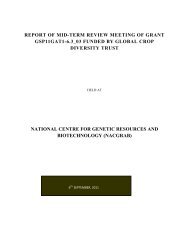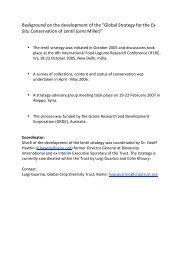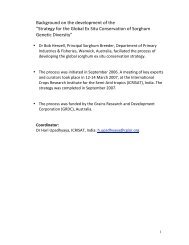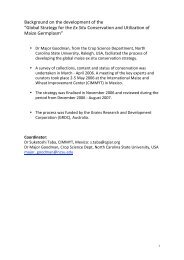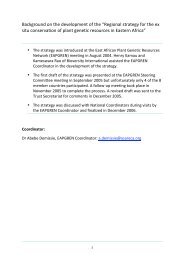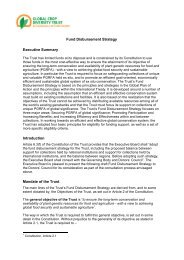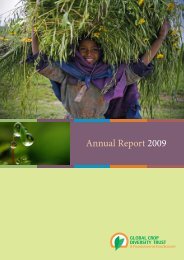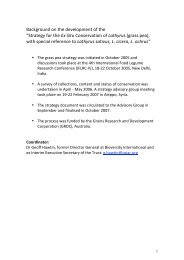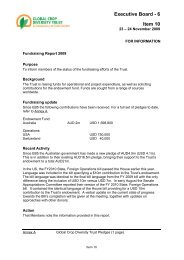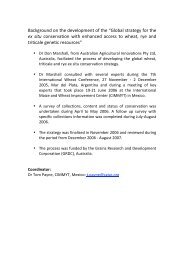Global Strategy for the Ex Situ Conservation of Potato - Global Crop ...
Global Strategy for the Ex Situ Conservation of Potato - Global Crop ...
Global Strategy for the Ex Situ Conservation of Potato - Global Crop ...
You also want an ePaper? Increase the reach of your titles
YUMPU automatically turns print PDFs into web optimized ePapers that Google loves.
facilities and storage methods vary substantially between collections. Finally, <strong>the</strong> health<br />
status <strong>of</strong> <strong>the</strong> potato germplasm is not always adequate, and safety duplication is not a<br />
common practice yet (see 5.4.6, 5.4.7 and 5.4.9). The questionnaire also revealed that<br />
general management practices have seldom been documented in written procedures and<br />
protocols as part <strong>of</strong> some <strong>for</strong>m <strong>of</strong> a quality management system (see 5.4.10). The<br />
participants in <strong>the</strong> Lima workshop recognized this deficiency and <strong>for</strong>mulated during <strong>the</strong><br />
workshop a project to establish minimum conservation standards (see 7.2)<br />
6.5 Networks and partnerships<br />
As summarized above, a number <strong>of</strong> networks and partnerships in potato genetic resources<br />
exist, in particular APIC, ECP/GR, and specific project-oriented partnerships involving CIP<br />
and o<strong>the</strong>r genebanks (see 5.5). Participants in <strong>the</strong> networks and partnerships meet<br />
irregularly. Participants <strong>of</strong> <strong>the</strong> Lima workshop stressed <strong>the</strong> importance <strong>of</strong> improving <strong>the</strong><br />
existing networks and increasing <strong>the</strong> number <strong>of</strong> partners. In addition to <strong>the</strong>se networks and<br />
partnerships, it was suggested to establish a global Consortium to oversee <strong>the</strong><br />
implementation <strong>of</strong> <strong>the</strong> potato conservation strategy, at least consisting <strong>of</strong> <strong>the</strong> organisations<br />
represented in <strong>the</strong> Lima workshop. At <strong>the</strong> <strong>the</strong> workshop such Consortium was established. It<br />
was decided that all curators <strong>of</strong> <strong>the</strong> participating genebanks (see list Annex 2b) in <strong>the</strong> Lima<br />
workshop would be members <strong>of</strong> <strong>the</strong> Consortium. In addition, representatives <strong>of</strong> o<strong>the</strong>r<br />
relevant potato collections, notably those held in Poland, Hungary, Spain, China, India and<br />
Japan could join <strong>the</strong> Consortium Regular meetings, organized once in every 3 to 4 years,<br />
similar to <strong>the</strong> Planning Conferences organised by CIP be<strong>for</strong>e 1987. Such consortium would<br />
be a useful tool to fur<strong>the</strong>r develop and implement a rational potato conservation system and<br />
could advise if appropriate on <strong>the</strong> implementation <strong>of</strong> <strong>the</strong> activities supported by <strong>the</strong> Trust.<br />
6.6 Proposed steps towards a rational potato conservation system<br />
During <strong>the</strong> Lima workshop <strong>the</strong> discussions focussed on major elements <strong>of</strong> a rational system.<br />
Initially, nine major elements were discussed.<br />
1. Improvement and extension <strong>of</strong> <strong>the</strong> documentation in existing international and regional<br />
databases as developed by APIC and ECP/GR; data <strong>of</strong> not yet incorporated collections<br />
should be included, and <strong>the</strong> in<strong>for</strong>mation <strong>of</strong> already included potato collections should be<br />
updated.<br />
2. Rationalisation <strong>of</strong> collections, using passport data and o<strong>the</strong>r relevant in<strong>for</strong>mation obtained<br />
from phenotypic and molecular characterisation<br />
3. Collaboration in setting standards <strong>for</strong> conservation, including regeneration, storage<br />
(facilities and safety distribution), and health aspects.<br />
4. Need <strong>for</strong> urgent regeneration <strong>of</strong> endangered accessions.<br />
5. Health screening in order to improve <strong>the</strong> health <strong>of</strong> potato germplasm to allow safe<br />
distribution; production and distribution <strong>of</strong> test kits <strong>for</strong> virus detection is regarded an<br />
important prerequisite in improving germplasm health.<br />
6. Training in genetic resources management, including in health aspects.<br />
7. Filling gaps in <strong>the</strong> collections, concerning species <strong>of</strong> <strong>the</strong> genepool not yet represented at<br />
all or under-represented in <strong>the</strong> collections.<br />
8. Improving <strong>the</strong> safety duplication <strong>of</strong> <strong>the</strong> collections.<br />
9. Repatriation <strong>of</strong> germplasm and associated in<strong>for</strong>mation to countries <strong>of</strong> origin.<br />
In <strong>the</strong> process, <strong>the</strong> participants <strong>of</strong> <strong>the</strong> workshop determined an order <strong>of</strong> priority <strong>for</strong> <strong>the</strong>se nine<br />
elements from <strong>the</strong> perspective <strong>of</strong> urgency. Five priority elements were identified <strong>for</strong> fur<strong>the</strong>r<br />
elaboration into proposals <strong>for</strong> future projects to be submitted <strong>for</strong> support by <strong>the</strong> Trust (see<br />
Chapter 7).<br />
20



